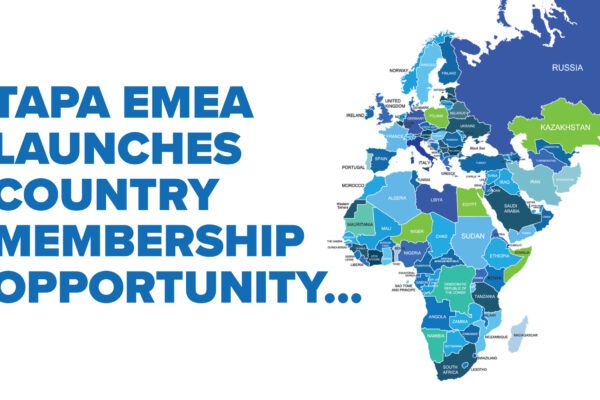
In the World of Supply Chain Security, it’s Good to Talk.
In the world of supply chain security, it’s good to talk. TAPA was originally founded over two decades ago by supply chain security professionals in the technology industry after companies recognised they stood a far better chance of reducing cargo thefts if they shared security intelligence and best practice experiences.
But it’s not always as easy as it sounds.
Competition and commercial pressures have made it virtually impossible for almost any forms of collaboration, but security considerations need to be approached differently – and, in the Europe,
Middle East & Africa region, TAPA EMEA provides a unique platform for learning, information exchange, and crime prevention collaboration. Many companies will still hesitate to join in but those that do see measurable benefits.
One of the best current examples of this fresh thinking is the Tobacco Working Group, which has successfully united competitors through their shared goal of building a safer and more secure future. In this special article, one of the Group’s founders, Gino Laios, Global Senior Manager Security Programs – Supply Chain & Manufacturing at Philip Morris International puts forward the case for supply chain security collaboration and explains why it’s time to talk …
In today’s fast-paced and interconnected world, the security of supply chains has emerged as a critical concern for organisations across industries.
As supply chains become increasingly complex and vulnerable, security professionals are realising how transformative the power of collaboration can be. This is no different in the tobacco industry. Ultimately, it is all about people. I can personally say that we would have not been able to get where we are today without building this cooperation between open-minded people who are fully committed and passionate about finding solutions and looking into designing new solutions. Our working group, known as the Tobacco Working Group (TWG) amongst TAPA members, is today a fully collaborative platform that not only focuses on its industry but also looking to set a trend in how all industries can become more resilient through united efforts.
There are many benefits for security professionals from otherwise competing companies to work together to enhance supply chain security and resilience. Examining the lessons learned from industry-wide initiatives on the evolving landscape of cooperation and shedding light on the pivotal role that TAPA EMEA plays in fostering collaboration, are only two examples. Moreover, the clear parameters that govern our industry meetings ensure fruitful, collaborative discussions while protecting potential commercial concerns.
Role of TAPA (EMEA) in promoting security collaboration
With the support of its network across each entity (EMEA, APAC, and the Americas), TAPA was paramount and instrumental in getting us where we are today. As an industry group, we continue to count on TAPA’s concerted drive and focus as a professional organisation with a global footprint (encompassing all the 3 existing entities TAPA EMEA, TAPA APAC and TAPA Americas) in continuing to help us develop one unified global voice.
Together with TAPA APAC and TAPA Americas, TAPA EMEA, as a leading industry association, plays a pivotal role in promoting security collaboration within the sector. By facilitating networking opportunities, knowledge-sharing platforms and industry conferences, TAPA provides security professionals with a robust ecosystem to collaborate and learn from one another. This collaboration must go beyond individual organisations, fostering an industry-wide approach to supply chain security.
Let’s walk through some of the key learnings from the Tobacco Working Group’s collaboration over the years.
Benefits of Security Professionals working together
When security professionals set aside their competitive differences and join forces, remarkable benefits arise. Here’s a closer look at the advantages:
1. Collective Intelligence for Advanced Threat Detection: Collaboration allows security professionals to pool their resources, experiences, and expertise to detect emerging threats more effectively. By sharing intelligence on new attack vectors, evolving tactics and vulnerabilities, organisations gain a comprehensive understanding of the threat landscape and can proactively implement robust security measures.
2. Strengthened Supply Chain Resilience: By collaborating, security professionals can conduct comprehensive risk assessments that identify weak points within the supply chain. This collective effort facilitates the development of proactive strategies to address vulnerabilities, thereby enhancing supply chain resilience. Organisations become better equipped to withstand disruptions, minimise losses, and maintain business continuity in the face of adversity.
3. Amplified Influence for Positive Industry Change: When security professionals from competing companies come together, their collective voice carries more weight. Collaborative initiatives enable the industry to advocate for regulatory improvements, industry standards and best practices. Through unified efforts, security professionals can effect positive change that benefits the entire supply chain ecosystem.
Value of security collaboration with industry colleagues
Collaboration with industry colleagues offers unique and profound value, which extends beyond the individual organisation. Why does it matter?
Shared Learnings and Holistic Solutions: Engaging with industry colleagues provides access to a wealth of insights and experiences. This exposure to diverse perspectives enables security professionals to devise holistic solutions that address complex security challenges. By learning from each other’s successes and failures, organisations can avoid repeating mistakes and uncover innovative approaches to securing supply chains.
Collective Defense against Evolving Threats: Criminals and adversaries consistently evolve their techniques, posing a challenge for individual organisations. Collaborating with industry colleagues fosters a proactive defence posture that adapts to emerging threats. Sharing threat intelligence and collaborating on threat hunting enables the industry to mount a united front against adversaries, fortifying the security landscape for all stakeholders.
Lessons learned and evolution of cooperation in the sector
The journey towards security collaboration has been a transformative one, yielding valuable lessons for the industry. As our organisations embarked on this path, cooperation has evolved significantly. The key insights gained from these conversations are:
Trust is the Foundation: Collaboration is built on trust: there are strong confidentiality protocols and clear rules of engagement put in place to make these meetings a safe and confidential space of sharing. The adherence to these principles allows the working group members to share relevant information and insight in a spirit of collaboration and trust.
Moving from Competitors to Allies: Traditionally, competitors operated in silos, guarding their security strategies as proprietary assets. However, the evolving threat landscape necessitates a shift in mindset. By embracing collaboration, organisations recognise that they can accomplish more together than alone. Competitors become allies in the quest for a secure supply chain ecosystem.
Integrate Business and Security Goals: Successful security collaboration requires the alignment of business and security goals. Organisations understand that resilient supply chains and robust security measures are essential for long-term success. This integration ensures that security considerations are not an afterthought but an integral part of strategic decision-making.
Embrace Technology to Advance: The digital transformation has significantly impacted supply chains, necessitating the adoption of advanced technologies. Collaborating security professionals stay at the forefront of technological advancements, leveraging innovations such as AI, machine learning, and blockchain to enhance supply chain security. The industry’s collective efforts drive technological progress and its application to mitigate emerging risks.
Clear parameters for industry meetings
Establishing clear parameters for industry meetings has been our priority from the start to guarantee that collaboration remains productive, respectful, and compliant with legal and ethical standards. Here are the essential principles of our collaboration:
Ensure Confidentiality and Data Protection: We have always prioritised confidentiality to safeguard sensitive information. This fosters an environment of trust and encourages open discussions without compromising commercial interests. During those meetings we keep the discussions strictly focused on the impact criminality has on our supply chains and manufacturing, and what we, as a collective, can do about it.
Focus on Collaboration, Not Competition: Our motto is “When it comes to Security, there is no Competition. It can only be Collaboration” Industry meetings prioritise collaboration and knowledge exchange. By focusing on shared challenges, we collectively develop innovative solutions that benefit the entire sector.
Focus on Practical Action and Driving Implementation: Industry meetings move beyond theoretical discussions and emphasise practical action. We identify tangible steps and initiatives that can be implemented to enhance supply chain security and resilience. This proactive approach has driven and continues to drive real change within the industry. We saw it happen!
In conclusion, collaboration among security professionals from competing companies is a truly transformative force that strengthens supply chain security and resilience. By leveraging collective intelligence, sharing best practices, and advocating for industry-wide change, organisations can effectively address evolving threats and optimise security measures. The lessons learned from our collaboration journey have highlighted the importance of trust, shared responsibility, and adaptability in building a robust security framework. TAPA’s instrumental role in promoting collaboration, providing a platform for knowledge exchange, has empowered security professionals to come together, transcending competition for the greater good of the industry. By adhering to clear parameters in industry meetings, security professionals can foster an environment of trust, collaboration, and innovation, driving the industry towards a safer and more secure future. Together, we can build resilient supply chains that withstand adversities and safeguard global commerce.
In this TAPA-rized world, we are not looking to be the exception, but rather pioneers and trendsetters. The times when all cards were kept close to our chest, so that the opponent does not see them, are long gone. Now, as an industry group, we are on the same side of the table, playing to win together. And we are ALL IN!
About the Author
Gino Laios is Global Senior Manager Security Programs – Supply Chain & Manufacturing at Philip Morris International, and an active member of the Tobacco Working Group. As the head of Global Programs for Supply Chain and Manufacturing Security at PMI, his role is to develop and deploy strategies, standards, governance, and assurance processes to effectively manage security risks across PMI’s global supply chain (transportation, logistics, warehousing) and manufacturing ecosystem.






















